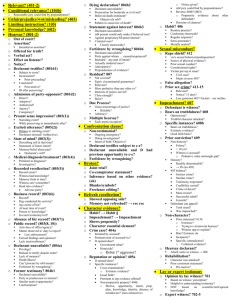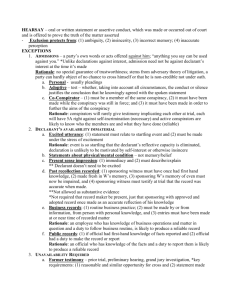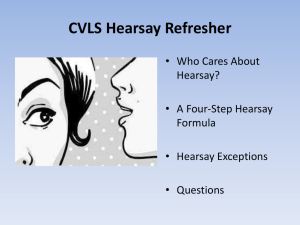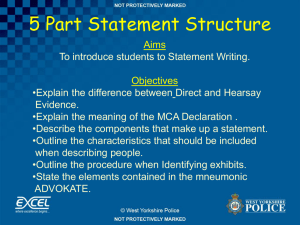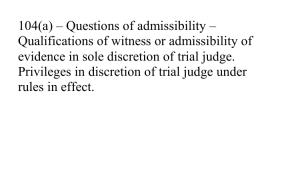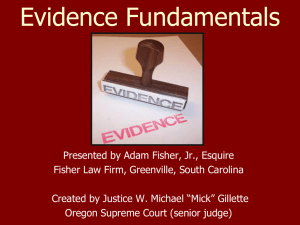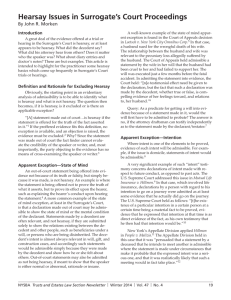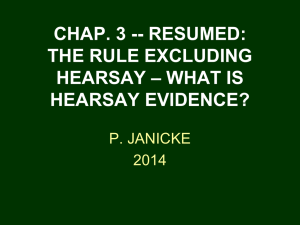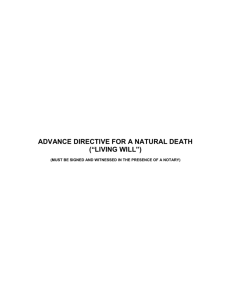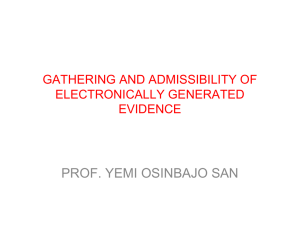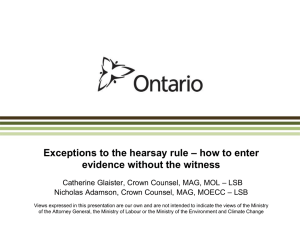Evidence Hearsay Checklist – Saltzburg
advertisement
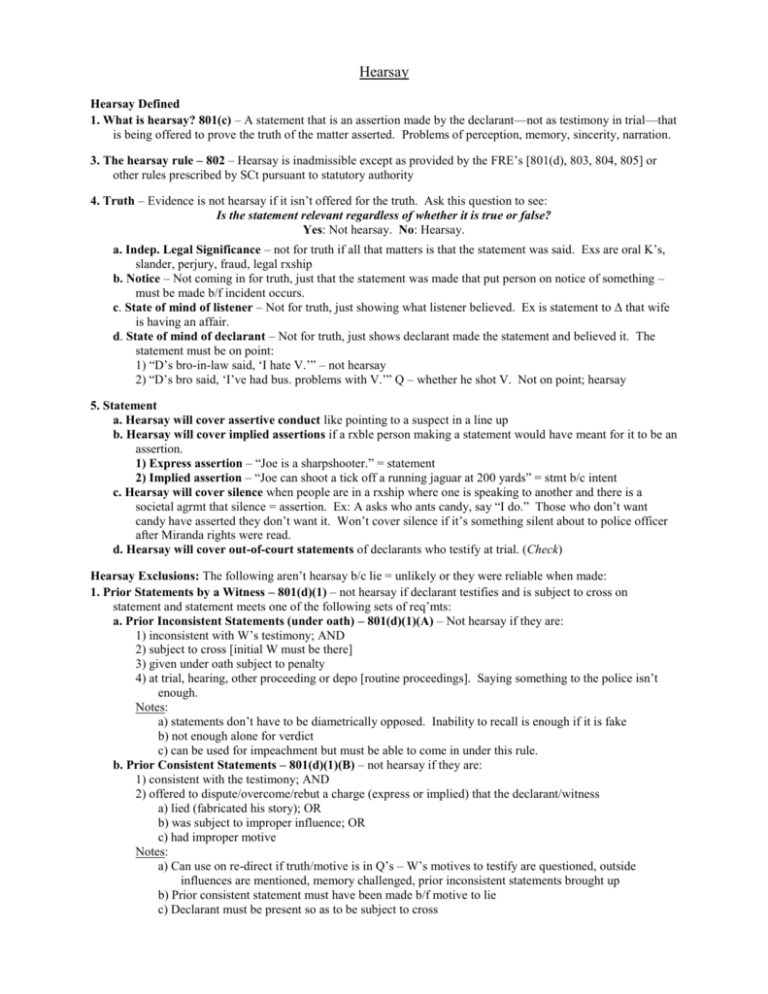
Hearsay Hearsay Defined 1. What is hearsay? 801(c) – A statement that is an assertion made by the declarant—not as testimony in trial—that is being offered to prove the truth of the matter asserted. Problems of perception, memory, sincerity, narration. 3. The hearsay rule – 802 – Hearsay is inadmissible except as provided by the FRE’s [801(d), 803, 804, 805] or other rules prescribed by SCt pursuant to statutory authority 4. Truth – Evidence is not hearsay if it isn’t offered for the truth. Ask this question to see: Is the statement relevant regardless of whether it is true or false? Yes: Not hearsay. No: Hearsay. a. Indep. Legal Significance – not for truth if all that matters is that the statement was said. Exs are oral K’s, slander, perjury, fraud, legal rxship b. Notice – Not coming in for truth, just that the statement was made that put person on notice of something – must be made b/f incident occurs. c. State of mind of listener – Not for truth, just showing what listener believed. Ex is statement to Δ that wife is having an affair. d. State of mind of declarant – Not for truth, just shows declarant made the statement and believed it. The statement must be on point: 1) “D’s bro-in-law said, ‘I hate V.’” – not hearsay 2) “D’s bro said, ‘I’ve had bus. problems with V.’” Q – whether he shot V. Not on point; hearsay 5. Statement a. Hearsay will cover assertive conduct like pointing to a suspect in a line up b. Hearsay will cover implied assertions if a rxble person making a statement would have meant for it to be an assertion. 1) Express assertion – “Joe is a sharpshooter.” = statement 2) Implied assertion – “Joe can shoot a tick off a running jaguar at 200 yards” = stmt b/c intent c. Hearsay will cover silence when people are in a rxship where one is speaking to another and there is a societal agrmt that silence = assertion. Ex: A asks who ants candy, say “I do.” Those who don’t want candy have asserted they don’t want it. Won’t cover silence if it’s something silent about to police officer after Miranda rights were read. d. Hearsay will cover out-of-court statements of declarants who testify at trial. (Check) Hearsay Exclusions: The following aren’t hearsay b/c lie = unlikely or they were reliable when made: 1. Prior Statements by a Witness – 801(d)(1) – not hearsay if declarant testifies and is subject to cross on statement and statement meets one of the following sets of req’mts: a. Prior Inconsistent Statements (under oath) – 801(d)(1)(A) – Not hearsay if they are: 1) inconsistent with W’s testimony; AND 2) subject to cross [initial W must be there] 3) given under oath subject to penalty 4) at trial, hearing, other proceeding or depo [routine proceedings]. Saying something to the police isn’t enough. Notes: a) statements don’t have to be diametrically opposed. Inability to recall is enough if it is fake b) not enough alone for verdict c) can be used for impeachment but must be able to come in under this rule. b. Prior Consistent Statements – 801(d)(1)(B) – not hearsay if they are: 1) consistent with the testimony; AND 2) offered to dispute/overcome/rebut a charge (express or implied) that the declarant/witness a) lied (fabricated his story); OR b) was subject to improper influence; OR c) had improper motive Notes: a) Can use on re-direct if truth/motive is in Q’s – W’s motives to testify are questioned, outside influences are mentioned, memory challenged, prior inconsistent statements brought up b) Prior consistent statement must have been made b/f motive to lie c) Declarant must be present so as to be subject to cross d) Can be used for rehab even if inadm under this Rule – with a limiting instruction. c. Prior Identifications – 801d1C – Prior statements by W (present and subject to cross) that ID a person whom W saw or heard are not hearsay. 1) Ex: police officer testifies that V ID’d Δ as his assailant. 2) Not subject to cross if makes ID and then refuses to testify (diff than lack of memory) 2. Admissions by a Party – Statements of Party – 801(d)(2) (used only by opposing party. a. When admissions are admissible: 1) own statement 2) adoptive statement – nod, shake head, post-arrest silence 3) authorized adm – auth by party to speak 4) agent w/in scope of employment 5) co-conspirator adm – made during course of conspiracy in furtherance of conspiracy Notes: a) No personal knowledge req’mt b) Adoptive statement – foundational req’mt that statement was heard and understood. c) Agent – made during existence of the rxship concerning issue w/in scope of rxship. Experts are not agents. Hearsay Exceptions that Require Declarant Unavailability 1. When is declarant unavailable? 804(a) a. Exempt b/c SM of statement is privileged b. Persists in refusing to testify (even after court order) c. Testifies to a lack of memory d. Is dead or suffers a physical or mental sickness (incompetency) e. Is absent AND the party trying to admit the statement can’t bring declarant in (in civil cases – can’t get declarant’s depo statement) through rxble means. f. Exception: Where any of the above is the result of user’s wrongdoing intended to prevent declarant from attending – fault/can include negligence. Notes: 1) Can’t assume privilege; 5th Amend. doesn’t count b/c Δ can’t procure own unavailability 2) Memory loss doesn’t need to be permanent, just long enough that the court won’t just postpone the trial 3) Disability – use balancing test if it’s temporary 4) Absence – in civil cases need to show couldn’t get deposition – subpoena; if doesn’t show, have court issue arrest warrant; if still no-show, use statement. 2. When does the hearsay rule not apply b/c the declarant is unavailable? a. Former testimony – 804(b)(1) – If at hearing/depo, person testifies and is subject to cross, then you may use the former testimony. 1) Requires similar motive; in civil cases, suffices that predecessor in interest to current adverse party had prior chance and similar motive to develop the testimony. 2) Can’t use grand jury testimony as former testimony but courts are split as to exculpatory evidence here b. Dying Declarations – 804(b)(2) – must be: 1) made by declarant who believed he was about to die 2) concerning cause or circs of expected death Note: a) admissible in civil and in homicide cases b) personal knowledge req’d c) impeachment by showing person didn’t believe in afterlife is allowed c. Statement Against Interest – 804(b)(3) – 1) Types – a) statements contrary to declarant’s financial interest b) statements contrary to declarant’s property interest c) statements tending to subject declarant to civil/crim liability d) statements tending to show that declarant’s claim against another is invalid 2) Req’d std – a rxble person in same position as declarant wouldn’t have made statement unless he believed it was true 3) Exculpatory (of Δ) statements – statements against declarant’s interest offered to exonerate Δ are inadmissible unless corroborating evidence exists. 4) Corroborating evidence (crim cases only) – when Δ offers exculpatory statement against declarant’s interest, presumption is declarant is making statement for wrong reason and need corroborating evidence for statement to be admissible 5) Penal interest – non-self-inculpatory statements weeded out. d. Personal/Family History – 804(b)(4) – statements concerning declarant’s birth, adoption, marriage, divorce, legitimacy, ancestry, rxship by blood. There is no personal knowledge req’mt. e. Forfeiture by wrongdoing – 804(b)(5) – see supra Hearsay Exceptions Not Requiring Declarant Unavailability 1. Present Sense Impression – 803(1) – describing or explaining an event or condition made while or immediately after declarant was perceiving the event/condition – most require corroboration/proof of occurrence. 2. Excited Utterances – 803(2) – about a startling event/condition made while declarant was under the stress of excitement caused by event/condition a. Requires personal knowledge and timing of excitement. 3. Statements of existing mental, emotional, or physical condition – 803(3) – statements of declarant’s state of mind, emotion, sensation, or physical condition a. Exception – doesn’t include statements of memory (to prove the fact remembered) or belief (to prove fact believed) unless the statement is about the declarant’s will. Notes: 1) foundational req’mt of relevance – “My leg hurts” is not enough to prove x & y fought b/c leg could hurt for a number of reasons. 2) State of mind – a) future conduct – statement of intention for future is admissible to show that that person did it but not that someone else did it b) exoneration – Δ can put in prior statements that he is afraid of guns if V testifies that Δ had a gun with him c) past acts – inadmissible b/c they are memory or beliefs; exception for wills 4. Statement for treatment or diagnosis – 803(4) – made for medical diagnosis for treatment AND describing medical history, past or present symptoms, pain, sensation, general character of cause of symptoms, pain, sensation. Notes: 1) can be made by anyone who knows the info 2) statement can be made to someone other than a doctor – ex, social worker 3) must be relevant for treatment/diagnosis – what happened, but not who or why or where. There is an exception for child abuse, domestic violence, sexual assault cases b/c identity is relevant to treatment. 5. Hearsay w/in hearsay – 805 – each part of the combined statement must satisfy an exception to the hearsay rule for it to be admissible. Exs are business records, exceptions where unavailability is required, 801 exemptions, etc. 6. Business records exception – 803(6) – records of regularly conducted activity are not hearsay if: a. they = memo, report, record, data compilation b. recording acts, events, conditions, opinions, diagnoses c. by a person with knowledge from info comm’d by a person with knowledge AND d. kept in regularly conducted business practices made at or near time of ac and it is regular practice of that business to make it (routine) Notes: 1) must be established by qualified witness (knowledge of how the records are kept, etc.) 2) must be trustworthy 3) bystanders are excluded unless fall outside hearsay rule 4) can’t be made in anticipation of litigation 5) overlaps with use of business records to disprove things, recorded recollection, and public records 7. Use of business records to disprove something – 803(7) – such matters must be normally included in business records and the matter at hand must be absent. MUST be trustworthy. 8. Recorded recollection – 803(5) – see supra; This is a memo or record that – a. concerns an issue W has knowledge on b. W can no longer remember enough to testify fully and accurately c. it was made/recorded when fresh in mind d. correctly represents W’s knowledge Note: read into evidence, but only adverse party can offer as exhibit in evidence 9. Public records – 803(8) – must be records, reports, statements, data compilations recorded by a public official/agency recording: a. officer/agency’s activities b. matters it observed under a duty of law and had duty to report – exs are health inspectors but not observations of a police officer in a criminal case c. in civil cases, factual findings produced by an investigation conducted with legal authority – can come in against govt in criminal cases but not against Δ; Excludes opinions Notes: 1) must be trustworthy 2) no foundation req’mt – unlike business records 3) limitations on police reports in civil cases, to – qualified person, based on sufficient info and investigation, legal conclusions are excluded, preliminary reports are excluded 4) officer reports relying on info from others a) investigations – experts – can rely on inadm reliable hearsay b) personal knowledge of underlying facts c) when public officer records info from private parties – 3P statements must 1. be made pursuant to a duty to report OR 2. satisfy independent hearsay exception 9. Absence of public record or entry – 803(10) – prove public record never made a. Must do a diligent search; comes in through affidavit of public official who did the search describing method of search and safeguards to prevent error. 10. Learned treatise – 803(18) – includes different media; expert relies on it in direct or its is called to his attn ion cross a. Must be shown reliable by testimony of expert or admission of expert or by other expert testimony or judicial notice. b. May be read in but not offered as evidence 11. Residual exception – 807 – if court determines all of the following are true: a. statement offered as evidence of a material fact b. statement = best evidence obtained through rxble efforts (probative) c. admitting serves general purpose of rules and interests of justice d. evidence has an equivalent guarantee of trustworthiness as other exceptions e. User notifies adverse party in advance of intention to use and specifics – fair opp to prepare, but noncompliance isn’t always fatal Notes: 1) Guarantees of trustworthiness – reliability of and necessity for the statement. Factors: a) rxship b/w declarant and person to whom statement is made b) capacity of declarant at time of statement c) personal truthfulness of declarant d) personal knowledge e) memory f) made under formal circumstances
